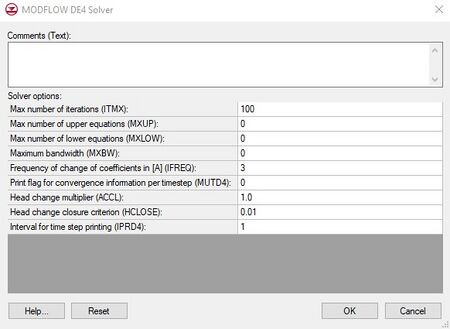GMS:DE4 Package: Difference between revisions
From XMS Wiki
Jump to navigationJump to search
No edit summary |
No edit summary |
||
| Line 6: | Line 6: | ||
* ''Maximum number of lower equations (MXLOW)'' – Impacts the amount of memory used by the package. Writes the actual number of equations in the lower part when the package runs. | * ''Maximum number of lower equations (MXLOW)'' – Impacts the amount of memory used by the package. Writes the actual number of equations in the lower part when the package runs. | ||
* ''Maximum bandwidth (MXBW)'' – Impacts the amount of memory used by the package. Writes the actual band width plus 1 when the package runs. | * ''Maximum bandwidth (MXBW)'' – Impacts the amount of memory used by the package. Writes the actual band width plus 1 when the package runs. | ||
* Frequency of change of coefficients in [A] (IFREQ) – Affects the efficiency of solution. May be 1,2, or 3. | * ''Frequency of change of coefficients in [A]'' (IFREQ) – Affects the efficiency of solution. May be 1,2, or 3. | ||
** 1 = Indicates that the flow equations are linear and that coefficients of simulated head for all stress terms are constant for all stress periods. | ** 1 = Indicates that the flow equations are linear and that coefficients of simulated head for all stress terms are constant for all stress periods. | ||
** 2 = Indicates that the flow equations are linear, but coefficients of simulated head for some stress terms may change at the start of each stress period. | ** 2 = Indicates that the flow equations are linear, but coefficients of simulated head for some stress terms may change at the start of each stress period. | ||
